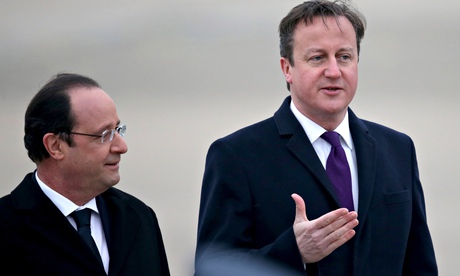English is not the lingo of the successful British exporter
Our reluctance to learn other languages is not just arrogant: it's holding back the UK's economic performance

What was that again? British PM David Cameron tries to make himself understood by Francois Hollande. Photograph: Matt Cardy/Getty Images
As François Hollande reshuffled the French cabinet last week, he was handed a report warning of hundreds of thousands more job losses. For a president grappling with political crisis and record unemployment it will have made grim bedtime reading after a day spent revamping his government for the second time this year.
The warning came from Jacques Attali, former special economic adviser to François Mitterrand, who had been asked by Hollande to look into ways the global reach of the French language could help drag the country out of its economic quagmire.
His report laid out two possible futures. In a best-case scenario, the right political support could foster a burgeoning global community of French speakers and enthusiasts that would "create or preserve 360,000 jobs in France" and perhaps even 1m by 2050. Attali calls this community of saviours the francophilophonie.
But a darker future beckons, Attali warns, if the political establishment refuse to grasp what he terms "the vast potential and great fragility" of the French language. Without the tongue's preservation and promulgation around the world, the francophilophonie shrinks; French firms lose market share; French universities, French films, French food all lose their appeal. That would cost 120,000 jobs by 2020 and half a million by 2050.
To avert this economic and cultural doomsday, the report has 53 recommendations, including encouraging the creation of French nursery schools overseas, building French cinemas and staging a global francophone festival. Much of it sounds expensive.
What happens in 2050 is not Hollande's problem, at least politically. His critics don't even see him making it through the second half of his term. But long-term planning is vital to securing trade in a changing world.
But surely the question for any head of state handed such a report is whether money for new cinemas and nurseries abroad would not be better spent on teaching more foreign languages at home. There is plenty of evidence to suggest that it would. In Britain, where "everyone speaks English" complacency has long dented our foreign-language ambitions, there have been a series of reports recently into the consequences of our monolingualism.
The British Council looked at the linguistic problems pondered by Attali the other way around. Asking which foreign languages are most important to Britain's prosperity over the next 20 years, it analysed economic, geopolitical, cultural and educational factors. The research identified Spanish, Arabic, French, Mandarin and German. But an accompanying YouGov poll found an alarming shortage of people able to speak them. Three-quarters of 4,000 adults surveyed were unable to speak any of them well enough to hold a conversation. Attali was probably pleased to see French was the only language spoken by a double-digit percentage, at 15%. Arabic, Mandarin, Russian or Japanese are each only spoken by 1%.
Business groups say our linguistic deficiencies are hitting the bottom line and thwarting the government's ambitions to increase exports. Despite English being widely spoken, two-thirds of firms in the UK cited a need for foreign-language skills among staff, according to a poll by the CBI and education company Pearson. Those sectors charged with leading Britain's rebalancing towards an export-led economy, notably manufacturers and professional services firms, were more likely to value language skills.
Former German chancellor Willy Brandt perhaps best summed up the advantages of speaking another language when he said: "If I'm selling to you, I speak your language. If I'm buying, dann müssen Sie Deutsch sprechen [then you have to speak German]."
British businesses appear all too aware of this. In a 2012 survey by the British Chambers of Commerce (BCC), 61% of non-exporters that were likely to consider trading internationally said a lack of language skills was a barrier.
The BCC has supported a "manifesto for languages" devised by the all-party parliamentary group on modern languages (APPG), which wants all political parties to push for more language teaching by schools and employers.
The manifesto begins: "English is an important world language, but the latest cutting-edge research shows that, in the 21st century, speaking only English is as much of a disadvantage as speaking no English." It cites an estimate thatthe UK stands to lose £48bn a year, or 3.5% of GDP, because of linguistic and cultural ignorance, a figure calculated for the Department of Business, Innovation and Skills by Professor James Foreman-Peck at Cardiff Business School.
Of course, it would be a sad world in which people learn the language, literature and history of others merely for monetary gain. But as competition grows and new markets emerge, economic factors are gaining importance in debates on foreign-language teaching and are shaping policy. When primary schools reopen this week, foreign languages will be compulsory for the first time.
Only time will tell whether this change helps dismantle Britons' reputation as lousy linguists. Yet surely a move towards multilingualism is a step in the right direction.
For Attali, France "can and should rely on its linguistic assets to return to a path of sustainable growth". But gone are the colonial days when European countries can hope to spread their languages around the world and make increasing gains from them.
French speakers and francophiles will continue to provide some life support to the ailing economy. France was the world's top tourist destination last year with almost 85 million visitors. Yet that influx did little to fan anaemic economic growth.
Francophilophonie is a tempting concept for a president in trouble. But France's problems are too big to solve with a few more Chinese shoppers, British campers and overseas Camembert sales.
English is not the lingo of the successful British exporter | Business | The Observer
.
.
.

No comments:
Post a Comment